The Intel SSD 760p 512GB Review: Mainstream NVMe Done Right
by Billy Tallis on January 23, 2018 11:30 AM ESTRandom Read Performance
Our first test of random read performance uses very short bursts of operations issued one at a time with no queuing. The drives are given enough idle time between bursts to yield an overall duty cycle of 20%, so thermal throttling is impossible. Each burst consists of a total of 32MB of 4kB random reads, from a 16GB span of the disk. The total data read is 1GB.
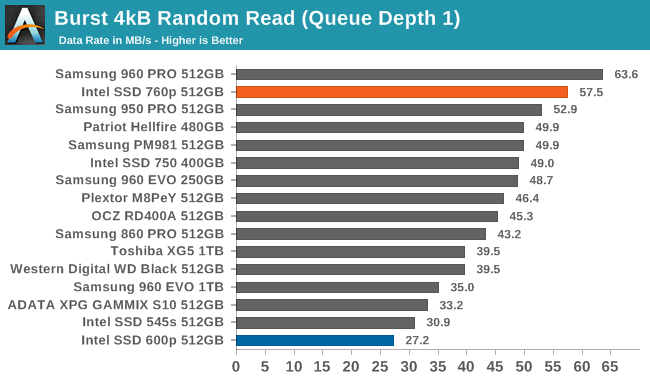
The burst random read performance of the Intel SSD 760p is great, even when compared against MLC-based NVMe SSDs. Samsung's 960 PRO is the only flash-based consumer SSD that currently beats the read latency of the 760p. The 760p has more than doubled the QD1 random read performance of the Intel SSD 600p, and is 17% faster than the Intel SSD 750.
Our sustained random read performance is similar to the random read test from our 2015 test suite: queue depths from 1 to 32 are tested, and the average performance and power efficiency across QD1, QD2 and QD4 are reported as the primary scores. Each queue depth is tested for one minute or 32GB of data transferred, whichever is shorter. After each queue depth is tested, the drive is given up to one minute to cool off so that the higher queue depths are unlikely to be affected by accumulated heat build-up. The individual read operations are again 4kB, and cover a 64GB span of the drive.
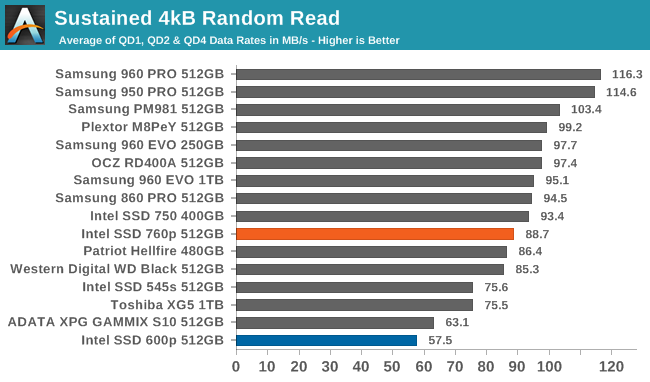
With a longer test runtime and some higher queue depths involved, the Intel SSD 760p no longer stands out from the crowd. Its sustained random read performance is reasonable given its pricing and the current field of competitors, but in a few months time it may be looking rather sluggish. The 760p is about 5% slower than the Intel SSD 750, but on the other hand it is 54% faster than the 600p.
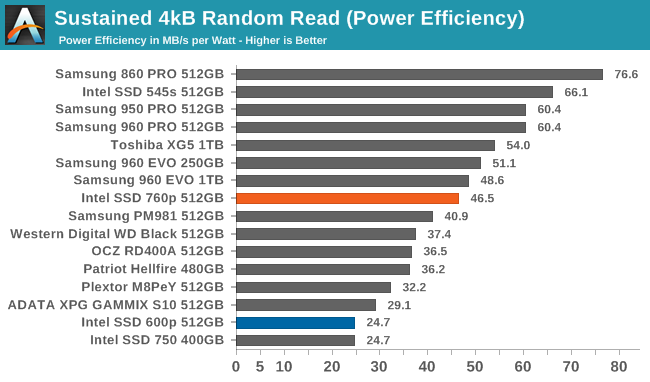
The power efficiency of the Intel SSD 760p during random reads is about average. Samsung's SSDs dominate the top half of the chart, and the two SATA SSDs hold the top two spots, showing that the performance of NVMe SSDs still doesn't offset their increased power consumption. Intel's previous consumer NVMe SSDs are tied for last place in power efficiency: the 750 is reasonably fast but power hungry, while the 600p has more modest power requirements but is quite slow.
 |
|||||||||
The Intel SSD 760p has decent random read performance at low queue depths, but it doesn't scale well at all with higher queue depths. By QD4, Samsung's drives have started pulling away, and at QD8 and higher most drives are faster than the 760p. Even Samsung's SATA SSDs have a clear lead over the 760p before they hit the wall of SATA performance limits. At QD32, most other NVMe drives are much faster than the 760p, and the high-end drives are all at least twice as fast.
The power consumption of the Intel SSD 760p during the sustained random read test is lower than any NVMe SSD we've tested so far except the Toshiba XG5.
Random Write Performance
Our test of random write burst performance is structured similarly to the random read burst test, but each burst is only 4MB and the total test length is 128MB. The 4kB random write operations are distributed over a 16GB span of the drive, and the operations are issued one at a time with no queuing.
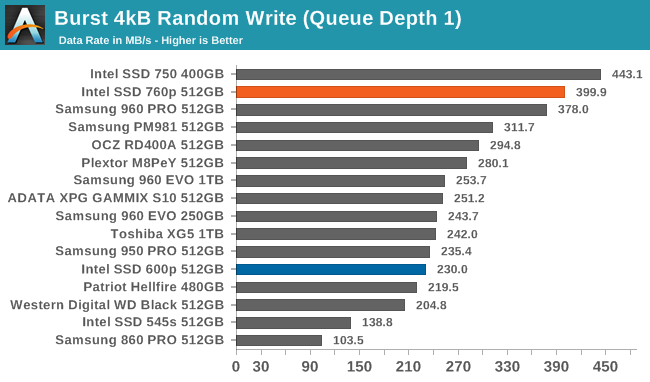
The burst random write performance of the Intel SSD 760p is second only to the Intel SSD 750. Since the 750 is based on an enterprise SSD platform with MLC NAND, this regression isn't at all surprising. That the 760p manages to beat the Samsung 960 PRO is quite an accomplishment. The 760p is also 73% faster than the Intel 600p on this test.
As with the sustained random read test, our sustained 4kB random write test runs for up to one minute or 32GB per queue depth, covering a 64GB span of the drive and giving the drive up to 1 minute of idle time between queue depths to allow for write caches to be flushed and for the drive to cool down.
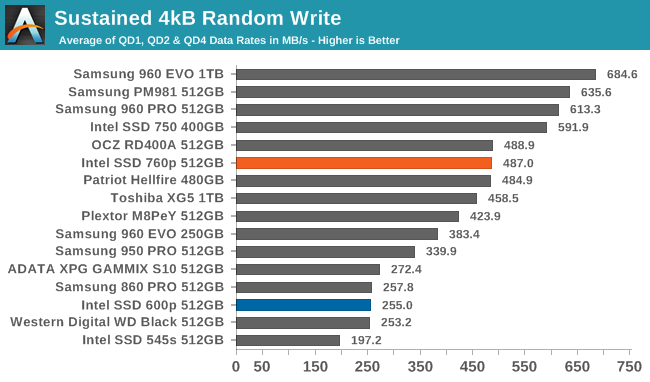
On the sustained random write test that involves some higher queue depths, the performance of the Intel SSD 760p is good but not outstanding. Several of Samsung's drives and the Intel SSD 750 are faster. However, the 760p is on par with some of the slower MLC-based competitors and is almost twice as fast as the Intel SSD 600p.
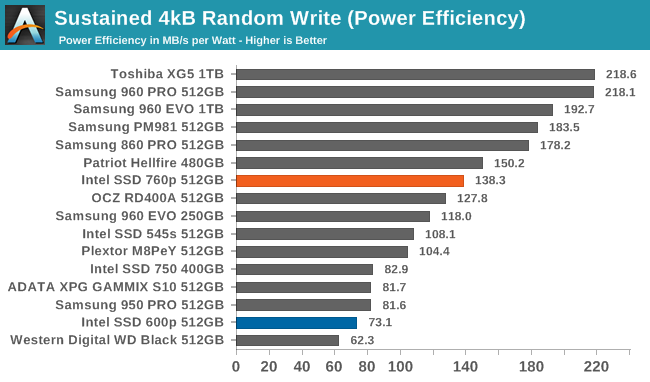
The power efficiency of the Intel SSD 760p during random writes is a bit above average, and is substantially better than any previous Intel consumer SSD. The Toshiba XG5 and most of Samsung's recent drives are far more efficient.
 |
|||||||||
The random write performance of the Intel SSD 760p saturates around QD4 at 600 MB/s. Most high-end NVMe drives continue showing improvement up to QD8, and the Samsung 960 PRO and EVO both top out with over twice the throughput of the Intel SSD 760p. The 760p is delivering twice the performance of the Intel SSD 600p with the same power consumption, but that's one of the few comparisons where the 760p is the clear winner.










51 Comments
View All Comments
HStewart - Tuesday, January 23, 2018 - link
Make sense especially with their own fab, they no longer need Micron to supply, but these chips are older generation, so they probably realize that future generations are not necessaryilt24 - Tuesday, January 23, 2018 - link
Intel converted a factory in China from making chipsets to making 3D-NAND a couple of years ago, then a couple of weeks ago Intel and Micron announced they would stop working together on 3DNAND once their 3rd generation was released ~2019. They said they would continue to collaborate on their 3DXpoint memory.Currently it isn't clear if all of Intel's supply comes from the Intel factory or if they are still getting any from the Micron fabs. Independent of where the flash comes from, it will have the Intel logo since they just get wafers from Micron and package it themselves.
rawcode - Tuesday, January 23, 2018 - link
Your pricing for the the Samsung 960 PRO are way off. You have prices for the 512GB in the 256GB column. 1TB for the 512GB, and 2Tb for the 1TB.Billy Tallis - Tuesday, January 23, 2018 - link
Fixed. Thanks!lux44 - Tuesday, January 23, 2018 - link
I guess post-Meltdown/Spectre benchmarking is in the pipeline, as IO-benchmarks should show a large drop... It definitely will make Core8 benchmarks a lot more interesting. I wish you all good luck in getting to the bottom of the things regarding performance impact, we count on you!tuxRoller - Tuesday, January 23, 2018 - link
Not as bad as was once thought.https://www.phoronix.com/scan.php?page=article&...
Ignoring the XFS results (just that they are using cfq means the fs is starting the fight with one arm, and most of a leg, disabled) it looks like 5% or less (except for the compile benchmark which caused one fs to drop 15%)
lux44 - Wednesday, January 24, 2018 - link
Given recent news about Intel microcode update recall and Linus's rants about unacceptable kernel updates, I think the actual Spectre mitigation impact is unknown, at least under Linux. I doubt it's larger than 15%, but we'll see.Jhlot - Tuesday, January 23, 2018 - link
Bummer, still significantly outpaced by the 960 EVO which was released more than a year ago.msabercr - Tuesday, January 23, 2018 - link
Dang it, this VW Beetle is nowhere near as fast as my 911 turbo.shabby - Tuesday, January 23, 2018 - link
Price is close enough that it should be.